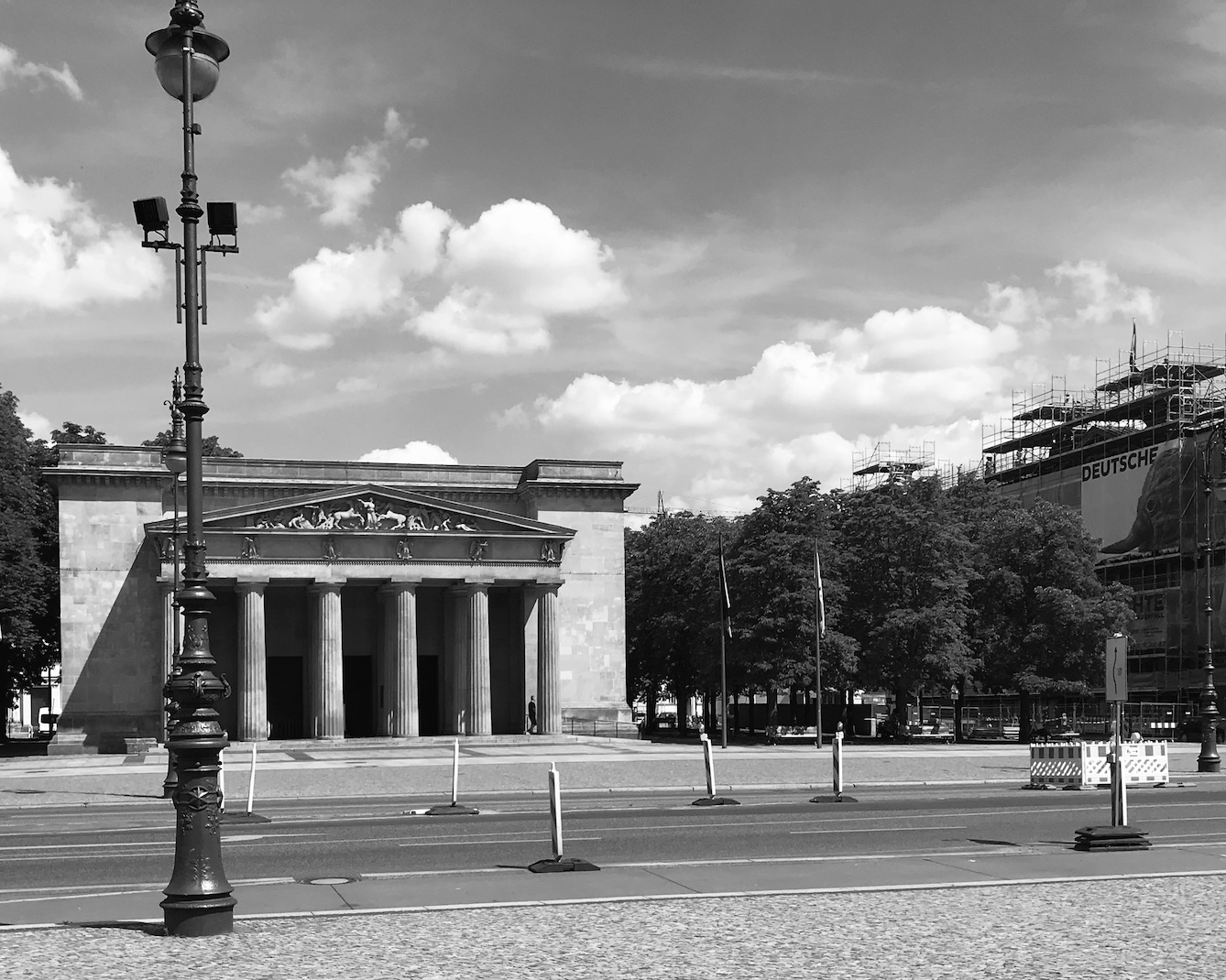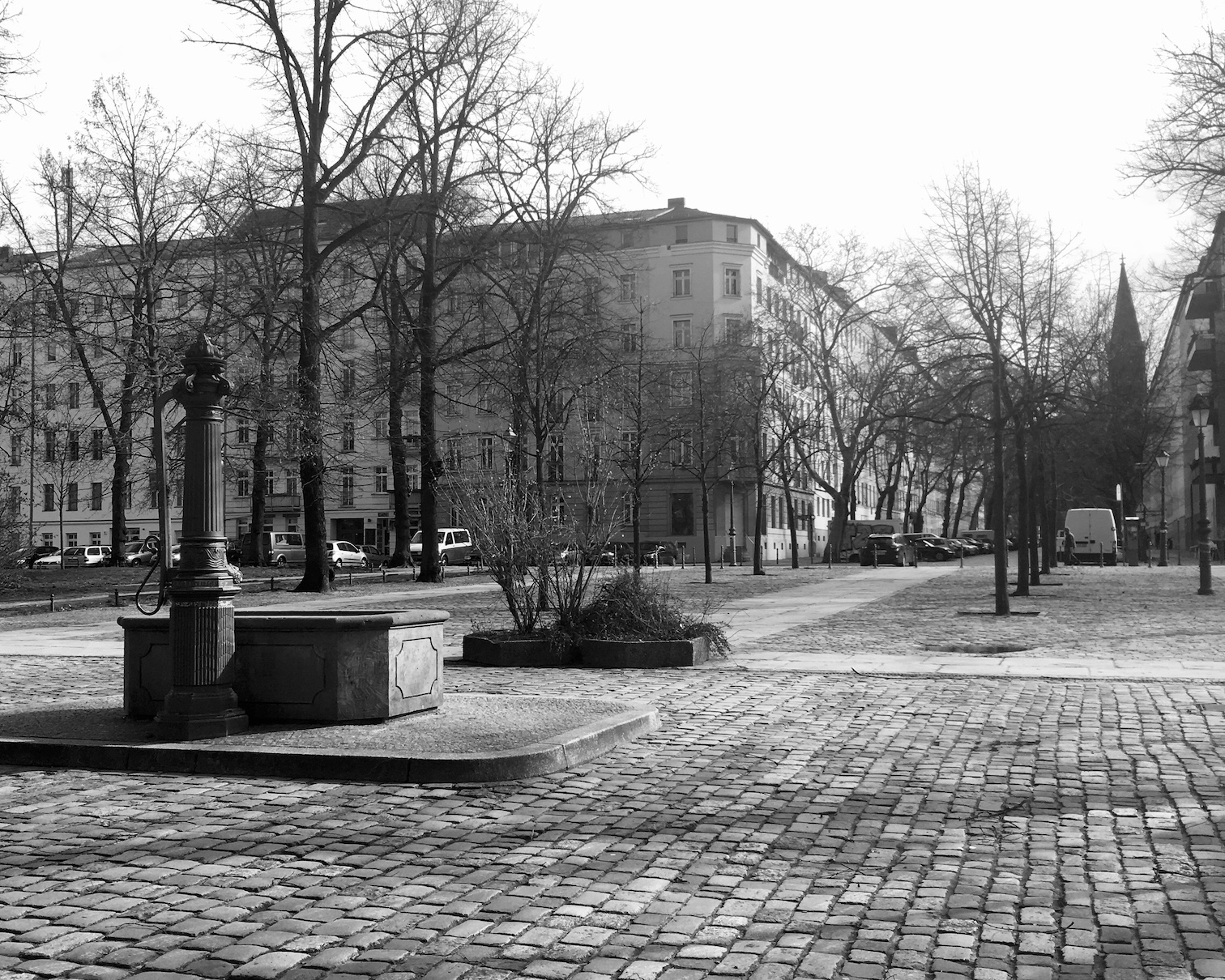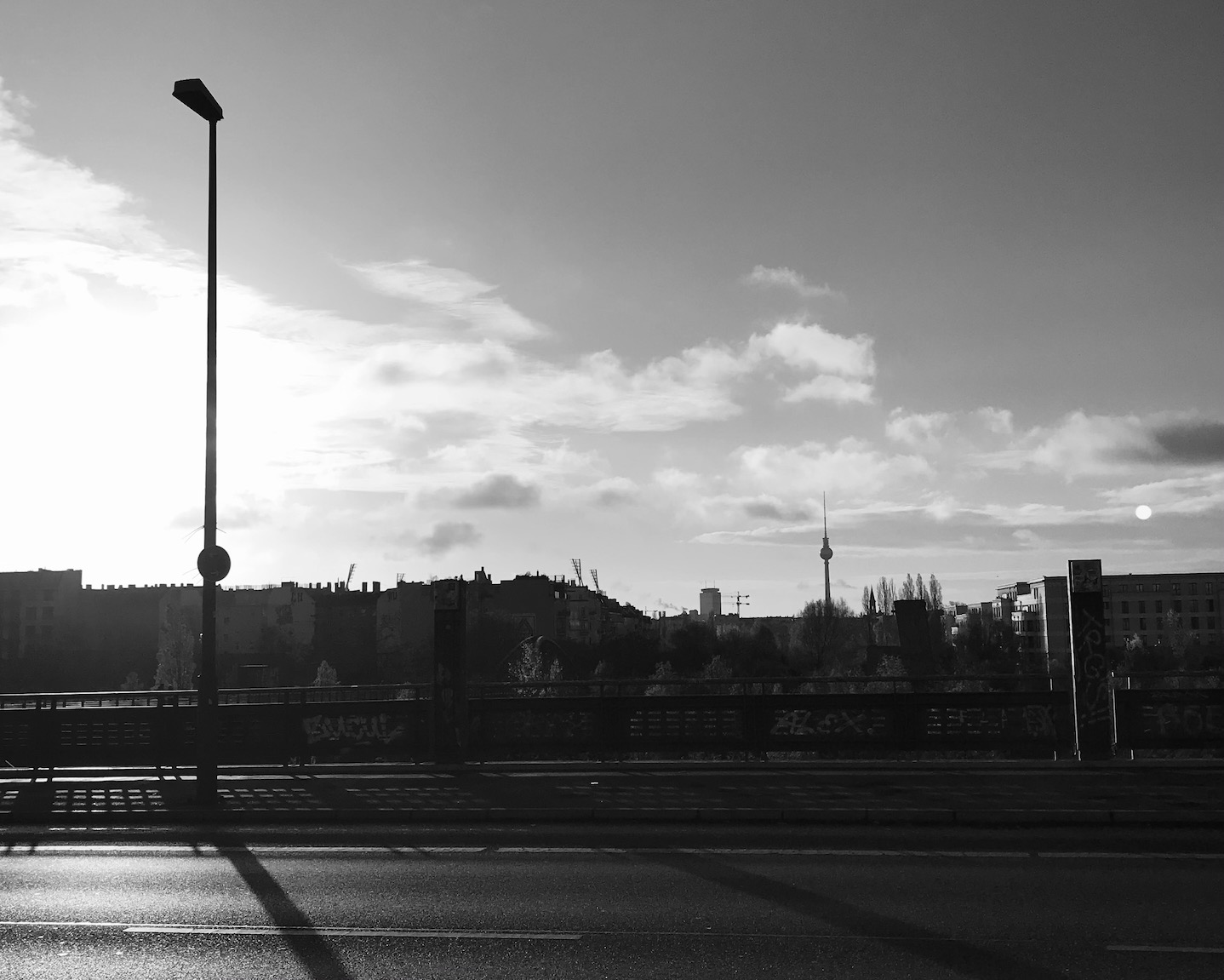Berlin Springtime
By Paul Scraton
On a walk from my apartment I come across an empty sandpit, surrounded by low green fences, the entrance blocked with red and white tape. Laminated signs on the playground gate. Closed. By order of the district.
Down by the Panke the five-a-side football court is also blocked, but the game continues on the grass next door. There is some anxiety that a mis-placed pass or a wild shot at goal might end up in the river, and every so often a dog – who usually has this grass to himself – wants to join in, but the match carries on. Later, on Swinemünde Straße, where the benches are full on another fine morning, the kids play on the outside of the playground gates, casting glances towards the forbidden swings and climbing frames, before they bounce rubber balls against the low wall and draw pictures in chalk on the flagstones.
In this Berlin springtime, in these strange and anxious times, we are all experiencing the city anew.
In his studio in Berlin Wedding, Hannes S. listens through an open window. No planes. More birds. Or better: the same amount of birds, just no longer drowned out.
From within the courtyard of his building, Peter C. records the birds, and also the human musicians playing in their own apartments. There is no attempt to play together, but the windows are open and the birds are there. It just happens.
In bed, the rain hammering at the window invades Holger S.’s dreams. In them, his neighbours have barricaded their windows with wooden planks and have painted on them slogans about the situation we’re in. The next day Holger feels as broken as if he’d spent the previous night drinking.
There is something of this Berlin springtime that reminds me of other moments, of other years and seasons. I am taken back to an afternoon when snow has fallen on the city, muffling its sound, changing its shape. The city is still familiar, but has shifted and altered, dreamlike. I like to walk the city when it snows, especially in the early evening if it is already dark. The cars are slowed. The snow falls through the streetlights glow. I enjoy the disruption, even though I know that there are others, their work changed or cancelled, or struggling home from the supermarket with a pushchair, who would have been happier if the snow hadn’t fallen at all.
Even before the Berlin springtime my days were mostly spent at home, but now more than ever the fine weather pulls me outside. I take ever longer walks through the city to see how it is changing. Sometimes I can see it clearly. The empty office buildings by Hackescher Markt. A New Year’s Day feeling on Alexanderplatz. The empty pavements of Unter den Linden. In other places I am not sure if what I am seeing is new, or if it is only that I am looking closely for the first time in years.
When did the shutters come down on that bar on Torstraße? Standing outside I remember my very first evening in the city. A bottle of beer and a shot of something herbal and a name with too many syllables. A dirty carpet and a pool of red light. Now the windows are boarded up. The sign taken down, exposing bare strip light bulbs. The chalkboard faintly advertising drinks never to be served. I try to remember the last time I was here, before. Was the bar still open then? I don’t know. My mind was on other things.
I dream of Rosenthaler Platz on a spring afternoon, long ago. My shift is over, but everything is closed. A permanent Sunday.
It is at night that Nika R. goes for a walk. It’s empty out there then. More comfortable.
We tend to notice what is missing. By the Spree I watch as the sun catches tiny waves caused by the wind and realise it is not only people who are missing from the embankment footpath but also boats from the water. There are no cruises today, no sightseeing tours. The city by the river has a different sound. No engines or loudspeakers, no crackle of different languages drifting across the water from tinny speakers. Instead it is the distant traffic I can hear, the laughter of a young girl on her bike and the ring of her bell. And the birds, always the birds.
On the way to the station, Katrin E. is suddenly aware that she hasn’t heard a rolling suitcase clat-clat-clattering their way down her street for weeks.
On Rosenthaler Straße the atmosphere is eerie. Hotels and restaurants sit silently behind darkened windows. The pavements are clear, the taxi rank abandoned. How many of the apartments looking down on the street are actually lived in? This Berlin springtime the mask of the city has been lifted a little, exposing how certain neighbourhoods have changed over the past twenty years. Close to home, on Badstraße, it is like nothing has happened. On Rosenthaler Straße it is a ghost town. Where is everybody?
A rough estimate in the newspaper is that there are five million missing tourists this Berlin springtime.
In front of Cafe Alibi, Georg S. comes across a trailer from Die Linke, offering up a sort of poem for these times:
Jetzt zeigt sich, welche
Jobs wirklich wichtig sind. Wird Zeit,
sie entsprechend
Zu bezahlen
There is a certain joy in a city stalled, in the break from the norm and the disruption of routine, but sooner or later time turns this strange pleasure into anxiety. On the stairs my musician neighbour counts off the sessions cancelled and the gigs that will never take place. Teaching and busking, he says, answering my question with a wry smile. He’s done it before.
Life moves outside. Ingrid B. attends an open air live music concert that includes a hymn. Is it sung as a prayer?
On my birthday we walk along the Panke, away from the city centre, crossing beneath the S-Bahn tracks where once the arches were blocked off with bricks and Berlin Wall watchtowers surveyed the scene. Most years we cross the old border in the other direction, to go to Prater, quite often in the springtime rain. This year we get our beers from the kiosk in the centre of the Bürgerpark, the beer garden tables blocked like a playground with red and white tape, so we sit on the steps and call family in England and Ireland. That we can share a drink together seems miraculous, and yet reminds us of the distance between us.
We change our routines, notes Linh H. We think before we do everyday tasks that before we performed unthinkingly.
As well as my longer walks, I try and go out with my daughter each afternoon, once her school day is done. Sometimes we walk along the Panke, discussing which Marvel movie we’re going to watch next or what the teacher actually said, when I misheard his dismembered voice from the hall. Sometimes we walk the streets of our neighbourhood at random, and I’m aware of the fact that after ten years in Gesundbrunnen there remain corners of what I like to think of as my home patch that I have never experienced before. On Bellermannstraße they are renovating an old corner pub. We follow their progress as they knock out walls and add new windows and doors. And then: nothing. Progress stalled. We will have to wait for the grand re-opening.
Georg S. is on Oranienstraße and Wienerstraße, where the pubs, clubs and bars are shuttered and dark. The soundtrack of the city has changed, the nightlife stilled. Who will come out the other side? How will the crisis reshape our city?
On the stairs of our building on Osloer Straße I meet our neighbours from a few floors below. Their girls have been home, their restaurant was closed. We do not know each other well enough to ask and answer the questions that hang in the musty stairwell between us. How long, how long. Time means everything right now, and everyone’s limit is different.
Max J. collates the new language of our times.
R-Faktor
Geisterspiele
neue Normalität
…
Maskenpflicht
…
Aluhütträger
Infektions-Cluster
Popup-Radwege
Superspreader-Event
…
Kern-Familie
Kinder-Bonus
…
the otherwise obligatory wheat beer shower has been cancelled on hygienic grounds…
Nevertheless, Bayern Munich still win the Bundesliga.
The city adapts. Every shop, whatever their normal business, is in the business of face masks now. Advertising hoardings are used by the government and health insurance companies to remind us to download important Apps and, of course, to keep our distance. Nightclubs become art galleries and fine dining establishments embrace delivery culture. On Seestraße the cinema doors remain locked, advertising films that have still not yet reached the screens. Across the street, fly-posters on a brick wall curl at the edges, announcing concerts and shows that never took place. Ghost signs that are barely two months old.
In the supermarket Georg S. sees that the distance markings on the floor are now being used to advertise bottles of tequila. Two for €20.99.
On one of my walks I meet a friend by chance. We do not hug each other, and we stand apart as we talk about how everything is at work and home. We ask after our respective partners and how our daughters are doing. It is a corner where normally there is a crowd of people waiting to cross the street, but it feels like we are the only two people there. We say goodbye without the normal gestures of farewell. We do not say that we should try and meet up soon, because we do not know if it will be possible. It feels awkward, and I walk away wondering if I did something wrong, but also unsure of how else it could have ended.
We cannot know what the Berlin springtime means, because it’s not over yet.
By Paul Scraton, with material from the audio, visual and written diary entries of various members of Berlin_Lokal_Zeit.



